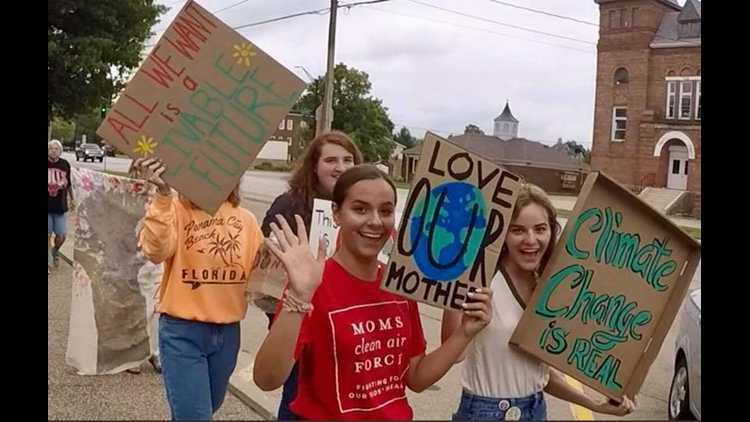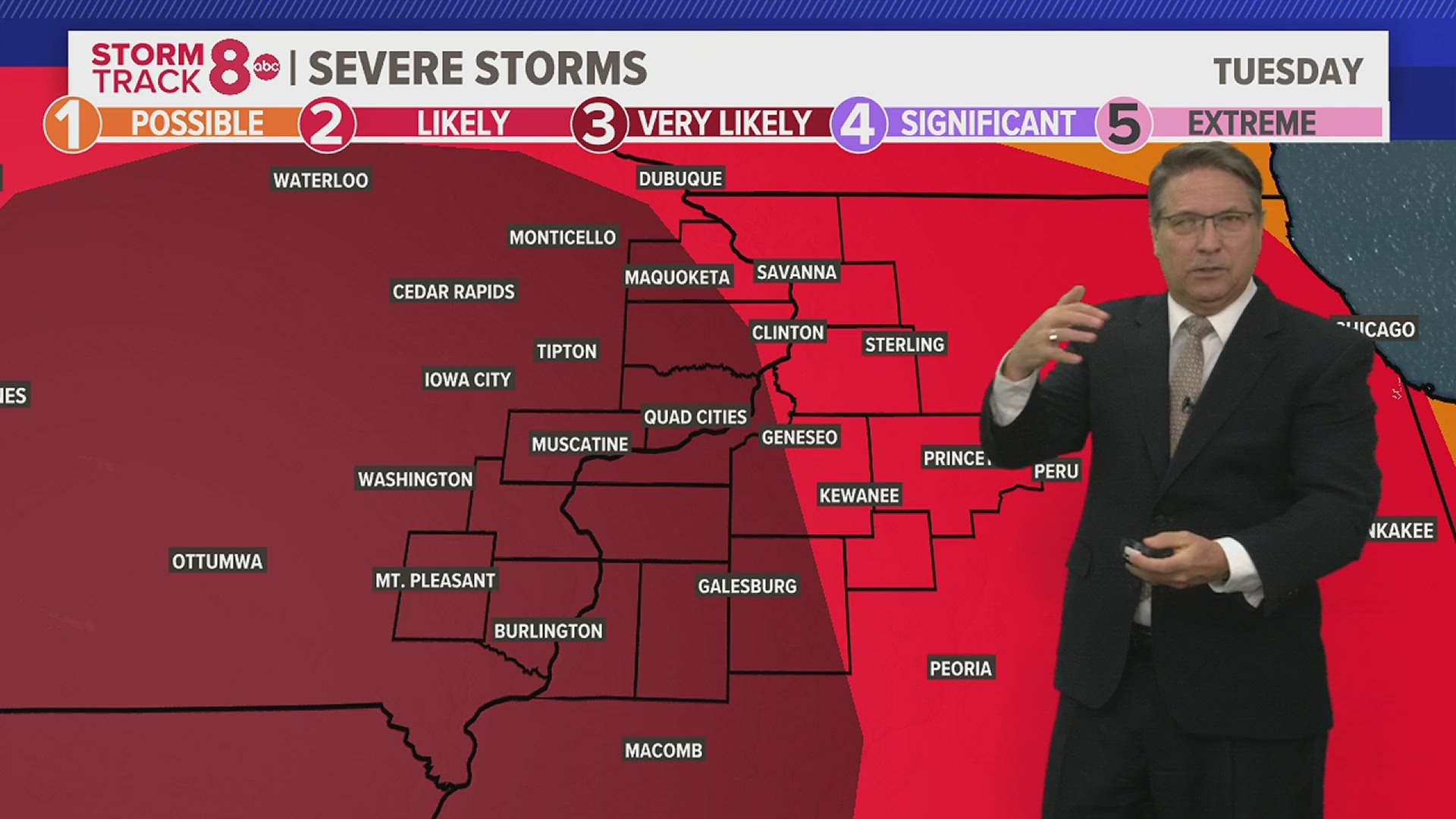GENESEO, Illinois -- Dozens of people rallied in downtown Geneseo on Saturday to show solidarity when it comes to the effects of climate change. But what made this rally different was it's coordinator is in high school! Elizabeth Yost coordinated the event which included speakers, face painting, and a march around the square.
Elizabeth Yost, holding the "Climate Change is Real" sign, coordinated quite a movement in Geneseo, Illinois on Saturday! I was honored to speak at the event which saw 100 people in attendance. The next generation isn't waiting for us to make change. #ZeroHour pic.twitter.com/ijvkALGCa6
— EricSorensen (@ERICSORENSEN) July 23, 2018
I was lucky enough to be asked to speak, as I feel it's important to continue learning about climate change and informing the public about it. Quite simply, as adults, we cannot rely on the old information that we learned in school. There's new information, new data, and new conclusions that show our atmosphere is warming more rapidly than it's been. And the facts behind climate change and its cause, are not political. What we do about it, however, is.
Despite a cold April, 2018 is the 14th warmest year on record so far in the U.S. https://t.co/qjJsGox6Tg pic.twitter.com/3iHcPDPvNl
— Climate Matters (@_ClimateMatters) July 18, 2018
Here is a transcript of my speech:
Here we are, talking about climate change on a “cooler than normal” weather day! But even in a warmer climate, we get occasional cool days.
Some people who don’t believe climate change is important believe we have abandoned the term “global warming.” In actuality, I like to think of climate change as driving a car. Accelerating is global warming. Decelerating is global cooling. And right now we are speeding up.
Climate change is a great topic for discussion that we need to do more often. In society today, the average American gets many notifications of the goings on in Hollywood and it seemsvwe get an overload of notifications on the news out of Washington D.C. these days.
But how much science information do we receive? For most people, science comes three minutes per day…in the form of a weather forecast. That’s the only regular source of science going into the eyes and ears of most people!
Now, consider that most Meteorologists on television choose NOT to talk about climate change. For many, it’s rooted in a fear that they will alienate 50% of their audience. But really, that percentage is about 20%. Still, I believe it’s my duty to report on it and we can't be afraid to give information because there isn't consensus politically.
But how? “How do I make climate change relevant to the people of Eastern Iowa and Western Illinois?” I can talk about droughts and wildfires in California and increased hurricane strength in Florida. But how do I make this relevant to people here?
Last year, I asked myself “What if I found a Climatologist to give me the science and then brought a Sociologist into the story to tell me why some people don’t believe the science? Then, what if I coordinated a focus group to discuss it?”
That very piece aired on WQAD News 8 last November and got no complaints or backlash.
In my research for that story, I stumbled upon a few things: Five of the top ten Mississippi River Floods in the Quad Cities have happened since 1993.
When I spoke with Dr. William Guttowski of Iowa State University, he told me that we should expect more of them.
Extreme weather happens more frequently in a warming climate. And Iowa State is developing new seed technology so that cornfields and soybean fields that are inundated with floodwater can still grow. They are also working on more drought-resistant crops.
That’s the reality of what we will need in a warming climate.
Dr. Wendy Schweigert, a Sociologist at Bradley University in Peoria taught me that changing our opinion is hard. We were given reasons to believe one way and in climate change we have new information that challenges an old way of thinking.
Another great perspective by Dr. Shweigert: We really know a little about a lot of different things. None of us here know a lot about a lot of different things.
Our climate is warming steadily. Around here, our winters are warmer than they used to be.
Warmer winters have an effect on agriculture because snowfall replenishes the soil with nutrients. Pests are also kept in check by regular cold spells. Just two examples of the impact of warmer winters.
The climate of the Quad Cities is the way St. Louis used to be 50 years ago. And in another 50 years, the Quad City climate will be more like Memphis. Climate change is happening quickly, which makes it more shocking that many Americans refuse to understand it’s impact.
I am of the belief that there are two ways to combat climate change.
1. We do everything we can NOW to change it. Anthropogenic Global Warming (or manmade warming) is reality. The industrial revolution has had an incredible detrimental impact on the climate of our world. What are we going to do to reverse it?
2. Wait until there is enough technology to adapt to the change. This one is a lot more risky. According to NOAA, in 2010, 123 million people, or 39% of the U.S. population lives right along the coast.
As sea levels rise, more people will be at risk. As agricultural land changes, more people will be at risk. As droughts impact water supply, more people will be at risk. Waiting around for a solution to the problems we are causing puts many more people at risk.
So what should we do now?
First, let’s make it a point to communicate better about climate change. We can’t be afraid to talk about it…just because it may seem “political.” What makes climate change political is whether we use tax dollars to combat the problem or incentivize solutions.
Second, we need make the baby steps. Starbucks recently made headlines by eliminating drinking straws. Will that solve the problem? No, but you can’t finish the race without making all of the strides.
I was at a climate change conference two years ago and had the ability to ask one important question to a panel of Climatologists who won Nobel Peace Prizes in climate.
My question? What do we do when people are so steadfast in their opinion that they will never see my scientific point of view?
Since I took Amtrak to the conference, the answer was perfect. “It’s okay to leave them at the station, Eric. If they refuse to hop on board, you can’t delay the train and all of the people who choose to ride. It’s okay to leave some people behind. Never lose sight of the people who have your attention and want to understand what is fact. What is right.”
Finally, the reason I am speaking today. In 10 or 20 years when technology has put me out of a job and my kids ask me “Dad, why didn’t you talk about climate change if you were a Meteorologist and had that huge audience?”
I will be able to say, “I did, kids. Your dad did.”
Thank you!
-Meteorologist Eric Sorensen



